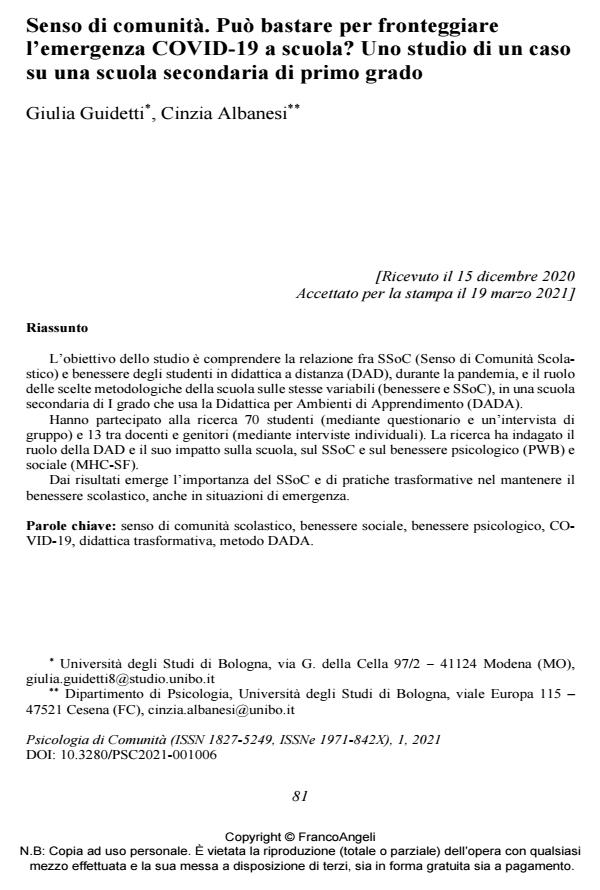Sense of community. Could it be enough to face the COVID-19 emergency at school? A case study of a middle school
Journal title PSICOLOGIA DI COMUNITA’
Author/s Giulia Guidetti, Cinzia Albanesi
Publishing Year 2021 Issue 2021/1
Language Italian Pages 15 P. 81-95 File size 212 KB
DOI 10.3280/PSC2021-001006
DOI is like a bar code for intellectual property: to have more infomation
click here
Below, you can see the article first page
If you want to buy this article in PDF format, you can do it, following the instructions to buy download credits

FrancoAngeli is member of Publishers International Linking Association, Inc (PILA), a not-for-profit association which run the CrossRef service enabling links to and from online scholarly content.
The goal of the study is to understand the relationship between SSoC (School Sense of Community) and student well-being in distance learning and during the pandemic. The goal is also to understand the role of the school’s methodological choices on the same variables (well-being and SSoC), in a middle school which uses DADA method. Data were collected using group interview and questionnaires with students (N = 70), and individual interviews with teachers and parents (N = 13). The research investigated the role of distance learning and its impact on school, SSoC and psychological (PWB) and social (MHC-SF) well-being. The results show the importance of SSoC and transformative practices in building a school that promotes even in emergency situations actor’s well-being.
Keywords: School sense of community, social well-being, psychological well-being, COVID-19, transformative didactic, DADA method.
- Continuità e fratture. Identità, emergenza e visione di sviluppo nelle comunità educanti Francesca Storai, Paola Nencioni, Roberto Trolli, in IUL Research 4/2023 pp.70
DOI: 10.57568/iulresearch.v4i8.503 - Protective and risk social dimensions of emergency remote teaching during COVID‐19 pandemic: A multiple mediation study Fortuna Procentese, Flora Gatti, Emiliano Ceglie, in Journal of Community Psychology /2023 pp.67
DOI: 10.1002/jcop.22879 - Teachers’ stress experiences during COVID-19-related emergency remote teaching: Results from an exploratory study Ilaria Vergine, Flora Gatti, Giulia Berta, Giulia Marcucci, Alice Seccamani, Carlo Galimberti, in Frontiers in Education 1009974/2022
DOI: 10.3389/feduc.2022.1009974
Giulia Guidetti, Cinzia Albanesi, Senso di comunità. Può bastare per fronteggiare l’emergenza COVID-19 a scuola? Uno studio di un caso su una scuola secondaria di primo grado in "PSICOLOGIA DI COMUNITA’" 1/2021, pp 81-95, DOI: 10.3280/PSC2021-001006